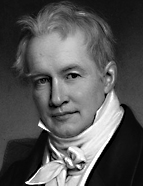

Alexander von Humboldt is best known in Portugal because of the question of the priority of Portuguese discoveries and the respective nautical science. Humboldt was not a historian, nor did he have any specific training in the critical comparison of texts (the basis of the examination he set out to make of the history of the Americas). He did not master the Portuguese language, which prevented him from gaining first-hand knowledge of the fundamental texts of the 15th-century discoveries (1420-1492). In 1847, in volume II of the French edition of Cosmos, he maintained that the boldness (hardiesse) of Christopher Columbus was the first link in the endless chain of mysterious events that constituted the Portuguese discoveries (Joaquim Bensaúde, Les legendes ..., p. 223 and n. 3).
The main purpose of the Examen critique de sur l’histoire de la Géographie du Nouveau Continent ... seems to have been, according to Armando Cortesão, “the glorification of Columbus, Vespucci and Behaim [Martin of Bohemia]”. Armando Cortesão describes the work as one that “undoubtedly and extraordinarily contributed to highlighting the importance of the history of the discoveries and their links with the history of cartography” ( História da Cartografia Portuguesa , vol. I, 1969, p. 27).
The Viscount of Santarém is well aware that the work in question, Examen critique..., contains methodological flaws, particularly in terms of the organisation of the arguments. He comments: “However, it is regrettable that this colossal work is not methodical. M. Letronne [curator of the Royal Library of Paris, professor at the Collège de France and editor of the French edition of 1836-39], who is one of his closest friends, asked me for my opinion, but did not wait for my reply and said, “n’est-ce pas que l’ouvrage de notre ami est un puits d’érudition et de confusion?” And Baron Walckenaer seems to anticipate what will be written the following year about the need to place the two texts, the Prussian and the Portuguese, side by side: “Walckenaer, the wisest man on these matters and a friend of Humboldt, wrote to me recently saying: “ J’ai été charmé de voir dans votre dernière partie sur Vespuce [Recherches critiques sur Améric Vespuce…] autant d’érudition que de logique. Je me propose de vous relire lorsque Mr. de Humboldt terminera ses éternels épisodes, a fin de pouvoir en parler de tous les deux dans le Journal des Savants et dans les Annales des Voyages .”
This work is financed by national funds through FCT - Foundation for Science and Technology, I.P, in the scope of the projects UIDB/04311/2020 and UIDP/04311/2020.
